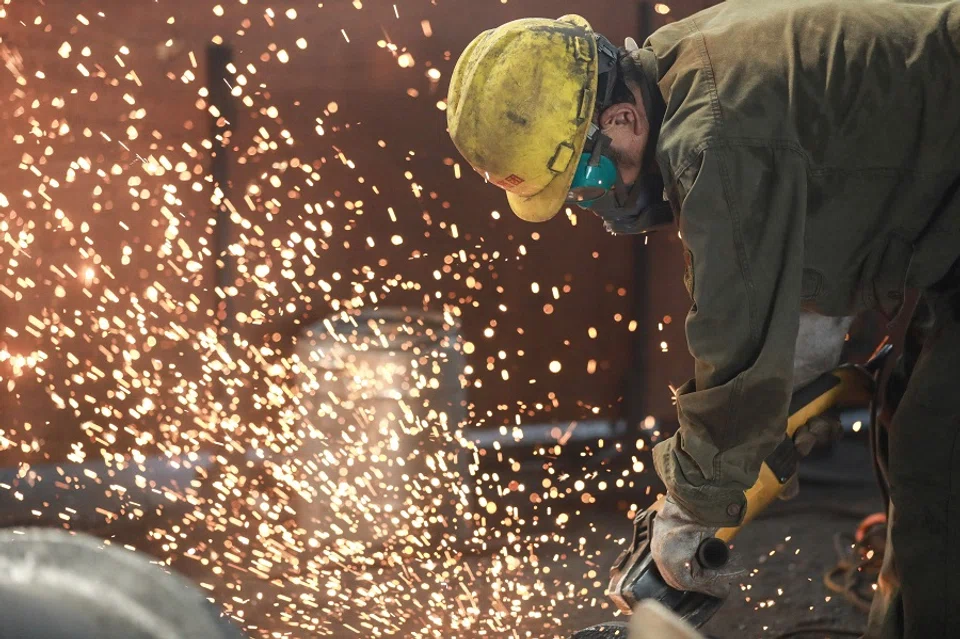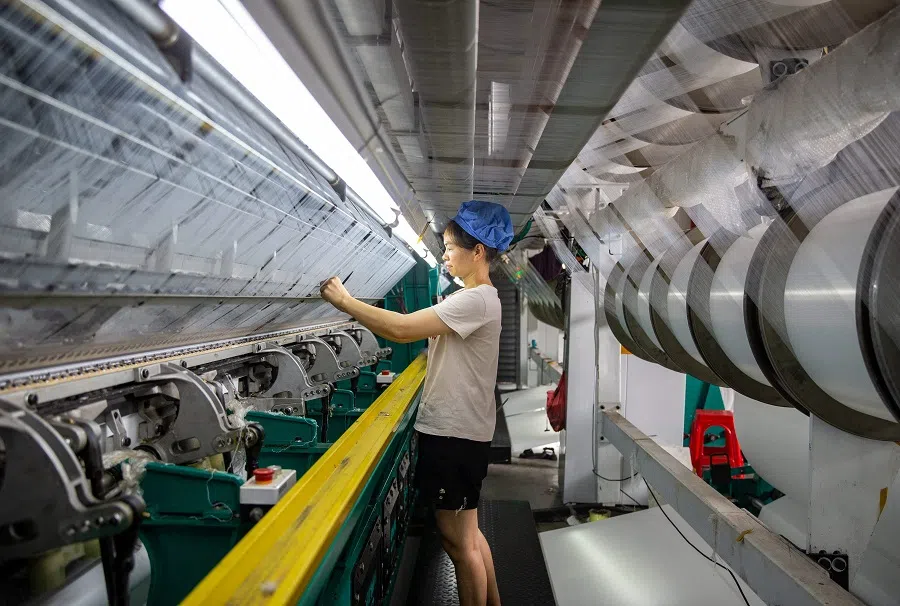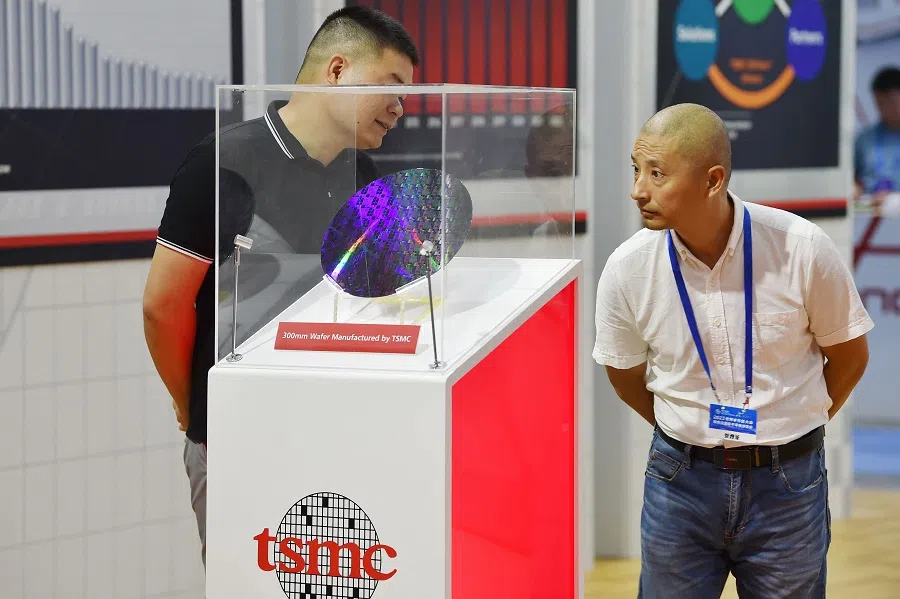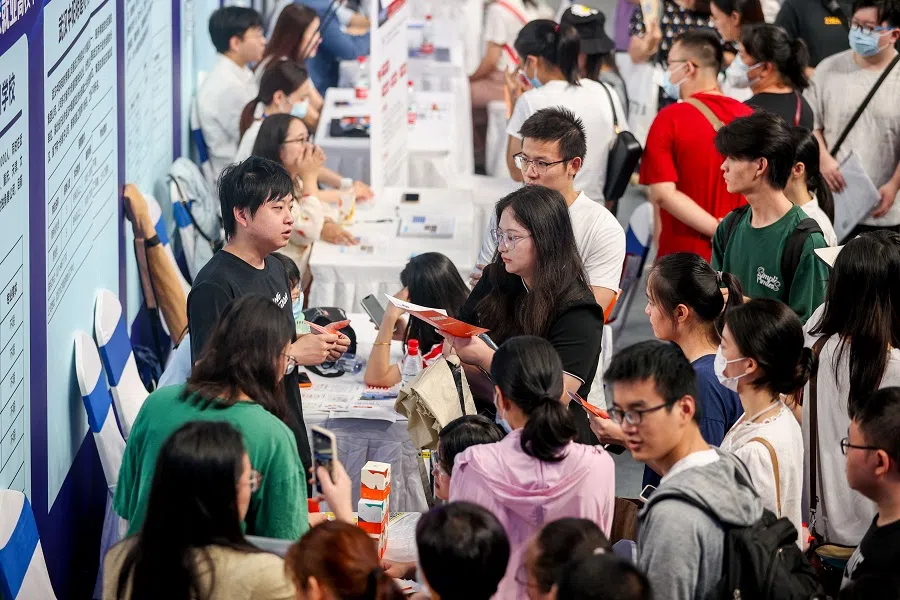[Big read] Taiwanese businesses' declining interest in mainland China
After the Covid-19 pandemic, the Chinese economy faces arduous challenges and the Chinese government is trying its best to attract foreign businesses and investors. While Taiwanese business owners are obvious targets, China is only looking to attract Taiwanese companies of strategic value, specifically those in info-communications and machinery manufacturing. At the same time, Taiwanese business owners have become more guarded about investing in the mainland due to growing internal and external uncertainties. Lianhe Zaobao journalist Miao Zong-Han speaks with industry experts to find out more.

Taiwanese firms operating on the mainland have been relocating their production lines and supply chains to Southeast Asia in a virtually irreversible trend since the start of the China-US tech and trade wars. At the same time, poor relations between mainland China and Taiwan as well as the pandemic's impact have also led to a decline in Taiwanese investment over the years.
Following the pandemic, the anticipated recovery of the Chinese economy did not happen, and Taiwanese enterprises are now dealing with the setback of dwindling domestic demand.
Relocating wherever possible
To better understand the present state of the mainland economy, Taiwanese business groups have organised numerous exchanges and visits there since March this year. But the feedback from many business owners has been sobering, with some halting production and subletting their factories to local businesses to minimise their losses from low orders.
The vast majority of the remaining Taiwanese businesses are small and medium-sized (SME) ones who do not have the means to leave.
Yuan Mingren is the general manager of a Taiwanese business consultancy that has been serving Taiwanese businesses for many years. In the last six months, Yuan has made several visits to Taiwanese businesses on the mainland.
Yuan told Lianhe Zaobao that even prior to the China-US trade war, big Taiwanese companies with the resources were already starting to relocate their production lines from the mainland to Southeast Asia due to China's diminishing demographic dividend and rising manufacturing costs.
"After so many years, nearly all of those who are able to have left", he said. Other than those who have adopted the business strategy of maintaining supply chains both within and outside mainland China, the vast majority of the remaining Taiwanese businesses are small and medium-sized (SME) ones who do not have the means to leave.
Amid a fall in domestic consumption and a severe reduction in overseas orders, these remaining Taiwanese businesses are struggling to stay afloat.
Yuan highlighted that these SMEs have operated in the mainland for over two decades. With all their hard work and capital invested in their businesses, the owners do not have surplus funds to move overseas. Thus, in the past six months, a number of ageing owners have chosen to sell their companies or have their children take over their businesses while they head back to Taiwan for retirement.
Over time, these Taiwanese companies will become mainland China businesses.

Yuan also mentioned that the descendants of many Taiwanese business owners are not keen on taking over the family business, so local management executives have taken over the reins at some of these firms instead. Over time, these Taiwanese companies will become mainland China businesses.
Not showing in the figures
Since April this year, Jivan Huang who heads the Mainland China Affairs Division at the Chinese National Federation of Industries (CNFI), has visited Beijing, Shanghai, Jiangsu, Zhejiang, Anhui and Chengdu. In an interview with Lianhe Zaobao, he voiced similar sentiments as Yuan.
Huang said that at the start of August, a Taiwanese original equipment manufacturer operating in Dongguan told him that his company has received 60% fewer orders this year as compared to the same period in 2022. Thankfully, the Taiwanese businessman also operates a restaurant and was able to cover the deficit from his factory using the restaurant's revenue.
... some municipal governments even aided the subletting to make it seem like these Taiwanese companies were still in business so that their performance in attracting foreign companies would not be affected.
Huang also shared that not all Taiwanese business owners operating on the mainland are able to successfully sell their factories because of preferential land-use policy restrictions and taxation issues. In fact, a number of Taiwanese companies have stopped operating and their owners had no choice but to sublet their factory premises to cut losses.
He also revealed that some municipal governments even aided the subletting to make it seem like these Taiwanese companies were still in business so that their performance in attracting foreign companies would not be affected. "Based on the figures, there is no drop in the number of Taiwanese companies," he said.
Many difficulties
Other than business groups, the Straits Exchange Foundation (SEF) which handles cross-straits matters at the behest of the Taiwanese government has also compiled the difficulties faced by Taiwanese companies in the mainland by facilitating the homecoming of such businesses in recent years.

Cai Mengjun, the spokeswoman for SEF, told Lianhe Zaobao that in the last few years, Taiwanese companies operating in the mainland often face problems pertaining to land sales, the direct or indirect transfer of share ownership, idle production capacity and the subletting of factory premises when relocating their production partially or entirely.
She went on to say that some Taiwanese business owners in China also struggle with fewer orders, manpower shortages, surging costs and breaking even. To bring in more orders, these companies need to adjust to supply chain reorganisations and new environmental regulations by the Chinese government in addition to upgrading and transforming their businesses, keeping expenditures low and downsizing.
... the number of Taiwanese investments in the mainland decreased by 12% in 2022, with the aggregate investment amount falling by 14%.
Cai also pointed out that big Taiwanese companies will constantly adjust and reorganise their overseas production lines in response to geopolitical influences and the China-US tech war.
As for Taiwanese SMEs using the mainland as their main production base, she expects that they will increase their competitiveness and reduce inventories through downsizing, cutting costs or automating; they might also seek new opportunities by relocating their production lines to cater to their clients' needs.
Waning interest among Taiwanese firms
According to official figures from Taiwan, Taiwanese companies have become less interested in investing in the mainland.
Since 2020, there has been an obvious downtrend in Taiwanese investment in the mainland. Data compiled by the Taiwan Ministry of Economic Affairs Investment Commission (MOEAIC) show that the number of Taiwanese investments in the mainland decreased by 12% in 2022, with the aggregate investment amount falling by 14%. In the first half of 2023, the number of investments dropped by 7% year-on-year, while the aggregate investment amount rose by 6% year-on-year.
Taiwan investment on mainland for past three years
(Source: Investment Commission, MOEA, Taiwan)
As for the distribution of Taiwanese businesses in the mainland, official figures from Taiwan show that in the first half of this year, the sectors with the most Taiwanese firms (starting from the top) were electrical components manufacturing, wholesale and retail, professional scientific and technical services, computers, electronics and optical products manufacturing, and base metal manufacturing.
SEF spokeswoman Cai interpreted the above-mentioned data as a decline in the impetus for Taiwanese firms to invest in the mainland, though conventional Taiwanese manufacturers are still using the mainland as their primary manufacturing base.
Figures published by the MOEAIC in mid-August show that in 2022, Taiwanese investment in countries included in its New Southbound Policy (NSP) reached US$5.27 billion (S$7.147 billion), surpassing the US$5.05 billion invested in the mainland for the first time since 1993. Additionally, in the first half of this year, Taiwanese companies invested US$2.12 billion in NSP countries, also exceeding the US$1.91 billion invested in the mainland over the same period.
Remitting mainland profits home
Other than cutting back on investment in the mainland, Taiwanese firms are also remitting more of their mainland profits home.
... certain Taiwanese business owners encountered difficulties in bringing their funds out of the mainland after they decided to bring their manufacturing capabilities back to Taiwan.
According to figures compiled by the Taiwan Financial Supervisory Commission (FSC), publicly-listed Taiwanese companies remitted NT$114.4 billion (S$5.068 billion) worth of investment profits back from the mainland in 2022, the most in a decade. On the same note, these companies remitted NT$15.6 billion back in the first quarter of 2023, setting the record for the highest amount remitted over the same period in at least a decade.
However, SEF spokeswoman Cai also highlighted that in the last few years, certain Taiwanese business owners encountered difficulties in bringing their funds out of the mainland after they decided to bring their manufacturing capabilities back to Taiwan. Furthermore, there are also Taiwanese business owners on the mainland who encountered problems such as currency exchange losses and difficulties in switching from exports to domestic sales due to interest rate hikes and inflation.

Additionally, since the start of this year, the Chinese government has also taken policy steps to manage the flight of foreign-funded enterprises.
In February this year, the China Securities Regulatory Commission (CSRC) published the Trial Administrative Measures of Overseas Securities Offering and Listing by Domestic Companies (《境内企业境外发行证券和上市管理试行办法》), authorising the CSRC to accept and review the filings of applications for overseas offerings and listings starting from 31 March 2023. The rules also govern companies whose primary business activities are in China.
The Taiwan FSC announced that as of 20 July, around 196 publicly-listed Taiwanese companies have been affected by the CSRC's new measures. Another nine companies that intend to file for public listing in Taiwan (this year) anticipate that they will be affected, with three companies having filed with the CSRC for their Taiwan listing plans.
Red carpet only for companies from certain sectors
In recent months, mainland China has also stepped up efforts to attract Taiwanese companies. At a forum held in Dongguan this July, Song Tao who heads the State Council Taiwan Affairs Office, encouraged Taiwanese business owners by emphasising that the Chinese government will support their business upgrading, transformation, innovation and development. It would also help widen the reach of their products and services in the Chinese market to provide greater convenience for Taiwanese companies in China.

Song also mentioned that the outlook for the Chinese economy was still bright with plenty of room for growth, so Taiwanese business owners should "keep faith, seize the opportunities, and meet the changes head on to develop faster and better".
Yuan Mingren, general manager of a Taiwanese business consultancy, observed that while the budgets of Chinese municipal governments are tight, many are still willing to provide Taiwanese companies with preferential policies and organise business promotion activities to attract such companies to invest. However, Yuan also noticed that it is harder to attract new Taiwanese business owners through such activities, instead, the aim is to get existing Taiwanese firms there to invest more.
... they are targeted at those that enjoy technical superiority, are irreplaceable or have competitive advantages and operate in areas like 5G, semiconductors or even machine tools or machinery manufacturing.
According to Jivan Huang, head of the Mainland China Affairs Division at the CNFI, some Taiwanese business owners told him that in the past two years, it was not easy for them to meet with local government leaders, or they often faced onerous policies that disadvantaged their businesses. But there has been a reversal of attitudes this year as "Taiwanese business owners are welcome again".
However, Huang also noted that the preferential policies were not extended to all Taiwanese firms. Instead, they are targeted at those that enjoy technical superiority, are irreplaceable or have competitive advantages and operate in areas like 5G, semiconductors or even machine tools or machinery manufacturing.
More support for Taiwanese manufacturing firms?
Huang pointed out that political sensitivities over info-communication products mean that Taiwanese firms in this sector have more reservations about entering the mainland market. In contrast, it would be easier for the mainland to attract Taiwanese machinery manufacturers.
He assessed that the mainland government will tweak its import substitution policies to encourage the relevant Taiwanese companies to set up operations on the mainland instead, thereby moving away from Taiwanese imports towards locally-produced substitutes.
However, Taiwanese machinery makers in the mainland have also been affected by the slowing Chinese economy and a contraction in domestic demand.
China Metal Products (CMP) is a leading Taiwanese metal manufacturer. It entered the mainland market in the 1990s and went on to set up plants in Tianjin, Suzhou and Xiaogan. In 2021, its new plant in Wuhan went into production and started manufacturing high-end precision parts for automobiles and engineering and agricultural machinery. CMP is a representative Taiwanese company in the mainland metal and machinery manufacturing sectors.
... as the mainland's manufacturing and export of electric and new-energy vehicles rise, there are signs that orders for the machinery industry will increase in the second half of 2023.

When asked about the departure of Taiwanese companies from the mainland, Lin Ting-fung, chairman of CMP, told Lianhe Zaobao that the larger investment outlays made by Taiwanese firms in the technically-sophisticated basic industries or automobile and agricultural machinery manufacturing sectors, mean that they are less mobile than those in the textile industry or electronics processing.
Lin also said that at the moment, the savings rate in the mainland is high and people are rushing to repay money they owe the government. At the same time, companies that are in good financial shape are also eager to repay their bank loans, resulting in lower demand for durable goods like property and automobiles. Consequently, after the lifting of Covid-19 lockdowns in late 2022, the number of orders received and operating rate of the machinery industry have fallen when compared to the previous few years.
However, Lin also pointed out that as the mainland's manufacturing and export of electric and new-energy vehicles rise, there are signs that orders for the machinery industry will increase in the second half of 2023. So, even though the impact of lower domestic demand persists, "it is not as bleak as we anticipated".
Lin then went on to share that as companies in the processing industries leave China, Chinese workers who used to congregate in its coastal cities head inland in search of new employment. At the same time, as the unemployment rate in China rises, its government has become more willing to invest in environmental protection, green energy, workplace safety and training. Its subsidisation of enterprises in the basic industries, which play a leading role in the job market, has also made it easier for employers in the machinery industry to hire new workers.
... Taiwanese companies are adopting a wait-and-see attitude when it comes to the next step of their investment in the mainland.
Taiwanese companies wait and see amid cloudy economic outlook
But Lin also opined that Taiwanese companies can only wait to find out how long such government subsidies will last. He was also candid in saying that on the whole, as a result of both internal and external factors, Taiwanese business owners are now much less willing to invest in the mainland market. At the same time, Lin also worries about mainland China replicating Japan's lost decades as businesses' appetite for investment declines.

Jivan Huang, head of the Mainland China Affairs Division at the CNFI, also said that generally, Taiwanese companies are adopting a wait-and-see attitude when it comes to the next step of their investment in the mainland. He said, "With a new political leadership just installed, weaker than expected economic recovery after the pandemic lockdown ended, and only moderate demand from Europe and America, (Taiwanese companies) will take some time to observe before deciding on their next course of action."
According to Huang, the third quarter of the year is usually a peak period for export-focused Taiwanese firms. There is a chance that more orders will come in from Europe and America, putting the business owners in better positions to make investment decisions. The next year or two is also a critical observation period and Taiwanese firms "that can remain will do so, while those that cannot can only leave".
This article was first published in Lianhe Zaobao as "台商投资降温 对陆转趋保守观望".

![[Big read] Paying for pleasure: Chinese women indulge in handsome male hosts](https://cassette.sphdigital.com.sg/image/thinkchina/c2cf352c4d2ed7e9531e3525a2bd965a52dc4e85ccc026bc16515baab02389ab)



